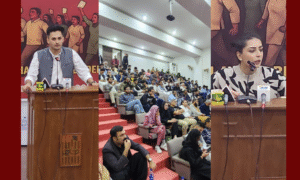Mahnoor Nasir
I am a student and a teacher. My interaction with academia, therefore, is twofold. I hold power and power is exercised on me. As a student, I am victim of the faulty online classes and as a teacher I must follow the university guidelines to continue teaching without regard for students as individuals with their complex circumstances. When I try to write about the injustices of the system, I also struggle to fight my biases and find my footing so I am able to articulate them with precision.
Here is the one line that has been uttered since schools, colleges and institutions were locked down: “We are in the middle of a pandemic.” We have been asked by the HEC and university administrations to envision our education in brand new dimensions as classes shift online. HEC declared a summer break only for universities to introduce the LMS system which falters and crashes the moment there is more traffic than a fifty or above students. Students, at the moment, might be proficient in navigating their way through the online system but our professors are not familiar with it. As a result, there is a constant state of panic due to the faulty system. On the other hand, we have students who do not have access to internet at all. A major reason for students to travel across cities, enroll themselves in universities and check themselves in hostels is because they would not be able to access higher education, at all, otherwise. They rely on computer labs for writing term papers because they do not even possess smart devices. There are students who have to leave their homes in order to find spots where they can find internet signals. Even in the major cities of our country, internet connectivity is not stable and students end up missing the deadlines due to lack of a stable connection. And while they pay the university fees for subpar learning, they must now also be able to afford internet connection. To add to their misery, universities are hiking up their fees while the quality of education has significantly taken a hit. While many professors are accommodating towards these problems, there are others who turn a blind eye to students’ concerns.
Let’s come back to the template that we robotically utter almost every other day now: “We are in the middle of a pandemic.” Then why is no one acting like it? As someone whose parent was tested positive for COVID19, I am empathetic towards each and every person who has to perform caregiving duties for sick family members. There are students who have been infected and yet have to take care of work load so as not to fall behind in their academic progress. Not to mention that there is a huge spike in corona patients without proper access to affordable healthcare facilities. All of these issues combined have triggered an anxiety and depression within our academic circles. I am surrounded by people who are unable to properly concentrate due to circumstances at home. In her book Teaching to Transgress, bell hooks captures this failure of the system to integrate a positive and healthy response towards crisis felt by students, “Through out my student years I felt deep inner anguish. Memory of that pain returns as I listen to students express the concern that they will not succeed in academic professions if they want to be well, if they eschew dysfunctional behavior or participation in coercive hierarchies.“
As our readings pile up, our deadlines hang above our heads like knives, our parents are let go of their jobs and we struggle to take care of sick family members, we request that the system registers these concerns as valid foundation to re-imagine learning prospects. It is quite a facade that HEC, along with school and university administrations, has put on under the guise of ‘online readiness”. They need to ensure that online readiness is implemented before futures are destroyed. That online readiness is set up until no one is deprived of it. There is no certainty as to when we will be able to go back to the normal mode of education. Moreover, we can anticipate that many students will suffer, might have to freeze semesters or drop out altogether if online classes continue without facilitating first.
Additionally, I want instructors to understand that during a pandemic, expecting students to perform with the same level of concentration and dedication is highly insensitive. Otherwise, students will continue to protest as they become more and more estranged with the system with each passing day. As a teacher myself, I believe that it is time for us to transgress our limited visions and assist students who are new to this form of education. I would like to conclude with bell hooks’ words, “To teach in a manner that respects and cares for the souls of our students is essential if we are to provide the necessary conditions where learning can most deeply and intimately begin.”
The Students’ Herald News Desk focuses on reporting the latest news regarding student politics and campus updates to you.
The News Desk can be reached at admin@thestudentsherald.com




